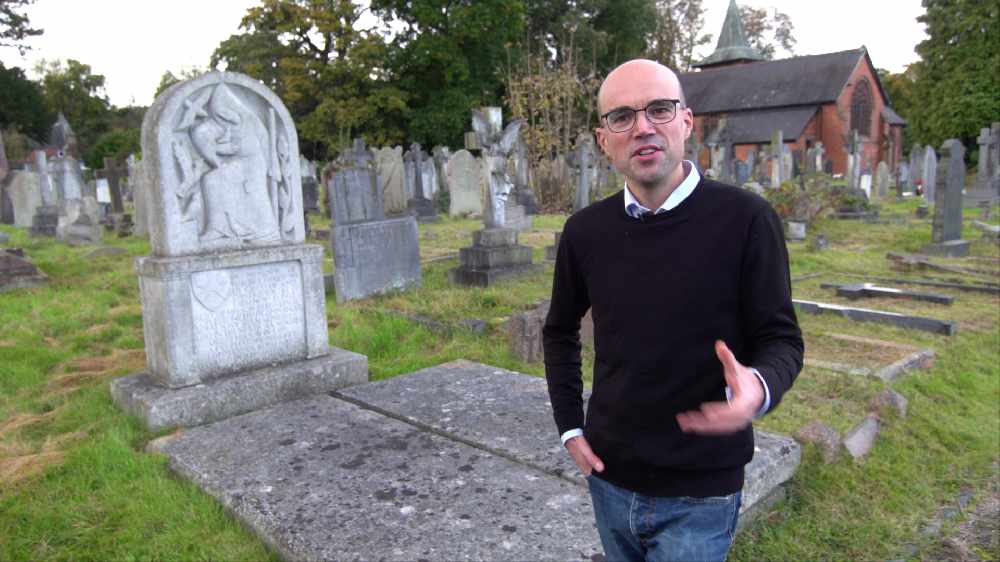
An alternative view of Chester’s world war story has been shared in a blog post, and video, by a University of Chester Professor, ahead of this year’s Remembrance Sunday.
Professor Tim Grady is Professor of History, and an expert on the history of Germany in the First World War, and 20th-century Jewish History.
In World War One, almost 3,000 German prisoners - military and civilians – died in British captivity. Professor Grady is keen to highlight some of the stories of those who died in Chester at the time, and how, because of where they were from, remembering them has been a more complicated process.
They include a German who hadn’t even been a soldier. Walter Sick had travelled to England in 1910, seeking work as a cook. He eventually settled in Manchester with his English wife and child. As Professor Grady explains in his blog: ‘with the outbreak of hostilities, Sick was arrested as an ‘enemy alien’ and interned in Queensferry camp, near Chester. He soon became ill with appendicitis and died in Chester Infirmary in November 1914.’
A second German to die in Chester was Rudolf Noack. He was a young soldier captured on the Western Front, who was taken to Handforth prisoner of war camp in East Cheshire. Noack also died of appendicitis in Chester Infirmary, five years later, in November 1919.
As Professor Grady explains: “Both Sick and Noack were buried in Overleigh Cemetery, but if you visit today, their graves are nowhere to be seen. In theory, their bodies would have been exhumed in the 1960s to the new German Cemetery on Cannock Chase. The German War Graves Commission designed this new cemetery to be a central place of remembrance for all of the German dead of the two world wars. It now contains almost 5,000 bodies, but neither Sick nor Noack are listed in the burial records there either. The pair died in Chester over 100 years ago and in all likelihood their remains are still in the city today. In the First World War, even in Cheshire, people died far from their country, their home and their loved ones, destined to remain forever in Chester.”
Professor Grady says he was moved to share this story to reflect that most British towns and cities reveal a complex history of war and loss. “Chester’s hidden history of war is not unique. All we need to do is to turn our gaze away from the centre and focus just as much on the overlooked margins. If we do this, then we will better understand that the two World Wars were not British conflicts, but in fact global ones.”
Pictured - Professor Tim Grady


 Ellesmere Port Electric Van Showcased at Manchester Motor Show
Ellesmere Port Electric Van Showcased at Manchester Motor Show
 COMMUNITY THEATRE SEEKS YOUNG ACTOR FOR LEAD ROLE IN SMASH HIT MONTY COMEDY
COMMUNITY THEATRE SEEKS YOUNG ACTOR FOR LEAD ROLE IN SMASH HIT MONTY COMEDY
 Three men arrested and illegal tobacco seized following partnership operation in Chester
Three men arrested and illegal tobacco seized following partnership operation in Chester
 Chester and Wirral Football League - Weekend Round Up
Chester and Wirral Football League - Weekend Round Up
 POPULAR QUIZ NIGHT AT CHESTER MARKET RETURNS TO RAISE FUNDS FOR LORD MAYOR'S CHARITIES
POPULAR QUIZ NIGHT AT CHESTER MARKET RETURNS TO RAISE FUNDS FOR LORD MAYOR'S CHARITIES
 Blues Match Report: Scarborough Athletic 1 - 0 Chester FC
Blues Match Report: Scarborough Athletic 1 - 0 Chester FC
 Blues Match Preview: Scarborough Athletic v Chester FC
Blues Match Preview: Scarborough Athletic v Chester FC
 The Cheshire Police and Crime Commissioner has saved ten PCSOs
The Cheshire Police and Crime Commissioner has saved ten PCSOs
 Illegal vapes, tobacco and alcohol seized in trading standards operation
Illegal vapes, tobacco and alcohol seized in trading standards operation
 Man charged in relation to burglary in Chester
Man charged in relation to burglary in Chester
 Active travel and safety improvements coming to Ewloe roundabouts
Active travel and safety improvements coming to Ewloe roundabouts
 Aquanatal Classes Make Waves at Local Swim School
Aquanatal Classes Make Waves at Local Swim School
 CFC Women's Team Mid-Season Review
CFC Women's Team Mid-Season Review
 Chester and Wirral Football League - Weekend Round Up
Chester and Wirral Football League - Weekend Round Up
 Chester Zoo hits new all-time visitor record in landmark year for conservation charity
Chester Zoo hits new all-time visitor record in landmark year for conservation charity